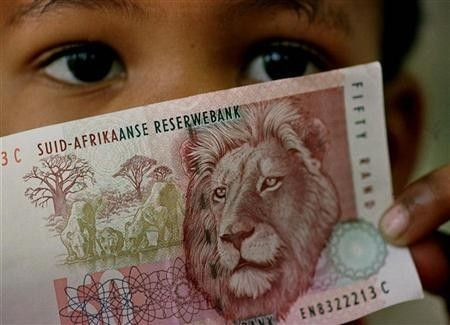ANC Treasurer General likes weaker rand

The recent weakness of the rand will benefit South African exporters and is positive for the economy, the treasurer general of the ruling African National Congress said on Wednesday.
I am not crying, we are not stressed about the weakness of the rand, definitely it's a spin-off for our exporters, Mathews Phosa told Reuters in an interview while on a trip to London meeting business people and politicians.
We should celebrate it -- a strong rand does not help exports, we have seen businesses breaking down.
The rand, like many emerging market currencies, was strong earlier this year as money-printing in the U.S. encouraged investors to buy high-yielding assets overseas. A strong currency raises the prices of businesses' exports.
But the South African currency has fallen sharply in recent weeks alongside a sell-off in commodities, as investors grow anxious about the global economy and the euro zone debt crisis.
The rand hit its lowest since May 2009 late last month, a plunge of 21 percent from the end of July, but has recovered slightly since then.
Phosa also said other industries should copy plans by a South African textile union to offer massive wage reductions to unskilled workers to create jobs.
We welcome this sort of development, to enable us to grow the economy to create jobs -- our labour costs are not competitive.
South African youth unemployment is at about 50 percent and a study by the South African Institute of Race Relations said about half of the current generation of those between 25 to 34 years old will never work in their lifetimes.
Economists have said without an inexpensive way to take new workers into a workforce suffering from a chronic unemployment rate of about 25 percent, the unemployed will likely remain unemployed -- raising government spending for welfare benefits.
Firms have shied away from South Africa due to the laws that make it expensive to hire and fire workers and are ranked by the World Economic Forum's Global Competitiveness Report as some of the most restrictive in the world.
MINES NATIONALISATION
Phosa said the businesses and politicians he was speaking to this week in London were interested in opportunities for public-private partnerships, but concerned about possible nationalisation of the mines.
Outspoken ANC Youth League leader Julius Malema wants to nationalise mines in the world's largest platinum producer and seize white-owned farmland.
Our policy does not provide for nationalisation, Phosa said, adding:
In a democratic movement, you do not say to people 'shut up', much as it is an issue which may cause uncertainty.
He said the issue was being researched and would be debated in the next year, with a decision due in Dec 2012 when the ANC holds a major policy setting meeting.
There are so many poor people in South Africa, but business will only invest if it can make a profit, he said.
We do not want to scare away investment, we need to find a win-win solution.
The ANC initiated disciplinary action against Malema in August, charging him with sowing dissension in its ranks. It postponed proceedings, which could determine his political fate.
Phosa, who defended Malema at a previous disciplinary hearing, declined to speculate on the outcome of the current hearing, or on any leadership challenge to President Jacob Zuma in internal elections next year at the major ANC gathering.
© Copyright Thomson Reuters 2024. All rights reserved.





















